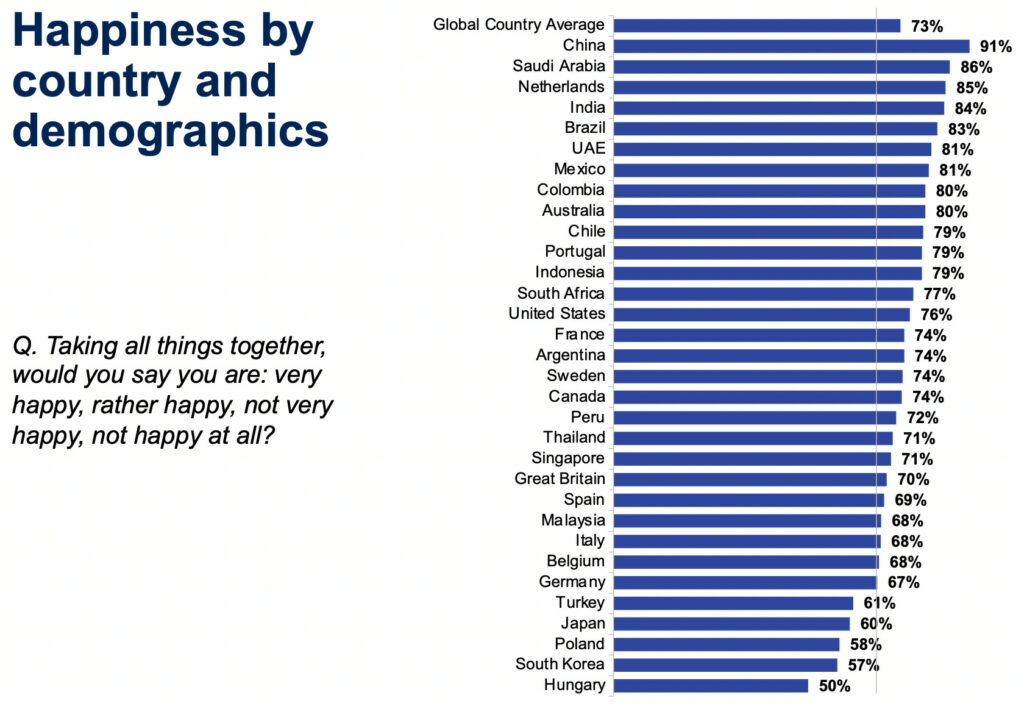The tyranny of the Geniusses. The Rule of the five percent
Written by Godfree Roberts. 22.05.2024

…
In What if we Lost our Smartest 5%? Matthew Archer suggests that we would struggle to maintain our quality of life without our scientists, mathematicians and engineers – the smart people whose efforts we take for granted. Yet when it comes to society’s most critical need and difficult task – running the country – our smartest five percent seem poorly represented. Meanwhile, the opposite is true in China.

Michelle Donelan, UK Secretary of State for Science, Innovation and Technology, meets Wu Zhaohui, China’s vice minister of Science and Technology. Donelan has a BA in History, while Zhaohui has a PhD in Computer Science.
The smartest guys in the room
Imagine the impact on European civilization of a series of Imperial dynasties maintaining the self-same style and significance from Caesar Augustus until the First World War. Now imagine such a civilization existing on the other side of the planet: unaware of Greek philosophy, the alphabet, Roman governance, Christianity, feudalism, the Renaissance, the Enlightenment or democracy, but with its own, unique cultural and institutional correlates that exceeded all of them in intellectual subtlety and material success.
— Fernand Braudel
Five hundred years before Christ, a would-be government official, Confucius, designed a harmonious, low-maintenance state by modeling it on the natural hierarchy of the family. Little family heads are responsible to clan heads, who are responsible to extended clan heads and so on, up to the head of the Big Family, the emperor. The trick, said Confucius, is finding “proper men” who want to serve the public good. Because running a state is so difficult and the temptations so great, emperors should choose officials for their moral integrity and intellectual abilities: honest, competent geniuses willing to devote their lives to selflessly serving their fellows and the dynasty:
The administration of government lies in getting men of strong moral character – the kind who will only be attracted by the ruler’s good character, which he cultivates by treading the path of duty. And treading the path of duty is cultivated by practicing compassion.
But the nobles were hostile to meritocracy and Confucius died convinced that he had failed. Corrupt eunuchs, scheming regents, dowager empresses, wicked uncles and rebellious generals then resumed their kidnapping, taxing and warring.
Undiscouraged, Confucius’ disciples continued to advocate his plan. And in 188 BC, they persuaded Emperor Wen of Han to stop imprisoning the parents, wives and siblings of common criminals. So positive was the response that the emperor began lowering taxes, abolishing corvée labor and giving monthly pensions to widows, orphans and retirees. When things went awry, he wrote Letters of Public Apology. As Confucius had predicted, peace and prosperity prevailed.
Emperor Wen next began examining nobles’ suitability for office – and soon wealthy, ambitious families were sending promising offspring to Confucian cram schools. A century later, thirty-thousand earnest young men were enrolled at Imperial Colleges where, as a form of meditation, they memorized the Master’s teaching on compassionate service until it permeated their feelings, thoughts and dreams.
Getting serious
After eight centuries of increasingly meritocratic promotions, Emperor Yang of Sui opened imperial examinations to peasants in 600 AD. (1) He instructed examiners (from whom candidates’ identities were concealed) to find men with intellectual depth and moral maturity, and to execute cheats.
Examinees answered questions on the economy, analyzed current government policies and composed original essays to demonstrate their brushwork, literacy, creativity and knowledge of the World. The Emperor himself queried top candidates, who quoted from memory case studies in governance and passages from the Analects (as they still do). Advancement by examination was class-blind (it still is) because, said Censor Wang Ji, “If selection by examination is not strict, the powerful will struggle to be foremost, and orphans and the poor will have difficulty advancing”.
By 1204 AD, of two-hundred seventy-nine senior officials whose families we know, forty-four percent had forebears in government (in 2018, it was twelve percent). Successful applicants became national celebrities:
When a scholar rides in a high carriage drawn by four horses, flag-bearers running ahead with a mounted escort bringing up the rear, people gather on both sides of the road to watch and sigh. Ordinary men and foolish women rush forward in excitement and humbly prostrate themselves in the dust stirred up by his carriage. This is a scholar’s joy. This is when his ambition is fulfilled.
Poor scholars who ascended on talent were the Emperor’s men through and through. They could neither own land, serve in their home provinces, nor have relatives in the same branch of government (as is still true). They competed for promotion by constructing public works – often in regions far from family and friends, under terrible conditions, and even at the cost of their lives (upwards of two-thousand lost their lives in the recently concluded anti-poverty campaign).
Though few in number – one official served every eight thousand citizens – they sustained the most harmonious, advanced, prosperous nation on earth. So illustrious is their record that virtually all Chinese heroes, whether historical or fictional, are government officials. Governor Li Bing, who designed and constructed the Dujiangyan water diversion project in 250 BC, is now God of Waters. His temple stands at the site of his project – which has returned to the nation one-hundred percent of its invested capital every day for two millennia.
That was then. This is now:
Today, as ever, there is one way to join China’s elite: by excelling in the world’s longest, toughest test: the guokao civil service examination. That’s why the smartest two-million of China’s eleven-million university graduates will take it this summer. The written examinations are much harder than the stiff high school gaokao, the orals are exhausting, and the competition ten times stronger – because geniuses are ten times more common. (2)
Chinese youngsters need an IQ of 140 – enough for a PhD in theoretical physics – to get a job interview with the country’s most prestigious institution. The smartest two-million kids take the exam, but just 27,000 (or 0.35%) will be invited to join the ‘priesthood’, whose vows of selfless service are stricter than the Jesuits’. (3)
Those with leadership aspirations will be sent to live in villages on the edge of a desert until they have lifted everyone’s incomes by 50%. They might then repeat the process at the county level before moving up. Most members of the current Steering Committee have done this. Xi himself did it at the village, county, provincial and national levels. When asked about his governing style in a 2011 TV interview, Xi quoted the Analects: “He who rules by virtue is like the North Star, which maintains its place and the multitude of stars pay homage”, and promised to do so. It appears that he kept his word.

Let people see that you only want their good and the people will be good. The relationship between superiors and inferiors is like that between the wind and the grass. The grass must bend when the wind blows it. If good men were to govern a country continually for a hundred years they would transform the violently bad and dispense with capital punishment altogether.
—Analects.
Although China has had its share of instability, this was usually because weak emperors allowed strife within the civil service to undermine national unity. Today, when President Xi reminds his fellow citizens about the “century of humiliation” and lambastes public servants for “petty factionalism,” they understand him perfectly.
Godfree Roberts wrote Why China Leads the World: Talent at the Top, Data in the Middle, Democracy at the Bottom, publishes the newsletter, Here Comes China, and blogs at Substack.
Footnotes:
(1)
Sociologists and economists have shown how education can both equalize mobility chances and reproduce inequalities. Most think education’s dual role emerged in the twentieth century. Data from excavated tomb epitaphs of male elites in China’s Tang Dynasty (618-907 CE), reveal patterns of education and mobility very much like contemporary ones.
After 650 CE, China’s Imperial Examination System (Keju) shaped social mobility in the medieval bureaucracy much as university education shapes mobility in rich countries today. Early in the Tang Dynasty, aristocratic ancestry was a distinct advantage, but over time, exam results took over.
(2)
The average American’s IQ is 99 and meeting one with an IQ of 140 is as likely as meeting one 6’7″ tall – one in a hundred. 160 IQs are as rare as people who are 6’10” tall – one in ten thousand. China’s average 106 IQ and huge population gives them 330,000* folks with 160, compared to America’s 10,000.
Assuming that China’s IQ was 105 at the time, Physicist Steve Hsu explains: “There are only about 10,000 people in the U.S. who perform at +4SD (IQ = 160) and a similar number in Europe, so this is quite a select population (roughly, the top few hundred high school seniors each year in the U.S.). If you extrapolate the NE Asian numbers to the 1.3 billion population of China you get something like 300,000 individuals at this level, which is pretty overwhelming.”
This means that the U.S. produces 9 children with IQs above 160 every year while China produces 270. (Statistician Dimitriy V. Masterov explains Steve Hsu’s calculations: “Steve Hsu, above, is using the augmented 68–95–99.7 rule to calculate what fraction of the population lies within 4 standard deviations of the mean, assuming IQ has a normal distribution”).
(3)
Though ‘priesthood’ sounds preposterous to our ears, F.W. Mote says officials’ influence with the people was greater than the Pope’s with Christians.



Another factor aside from the high admission standards for government leadership positions in China, is that smart people want to go into government. And that there is no huge wasteful economic sector acting like a brain drain on the productive sectors of the economy. In the United States many highly intelligent scientists and engineers work in finance and other unproductive sectors because the pay is astronomical in finance but very very poor outside of it.
Here is an article about physicists discovering new material properties related to how electrical currents work http://www.quantamagazine.org/meet-strange-metals-where-electricity-may-flow-without-electrons-20231127 , one physicist Liyang Chen “After a year of trial and error, Liyang Chen had managed to whittle down a metallic wire into a microscopic strand half the width of an E.coli bacterium (2 μm) — just thin enough to allow a trickle of electric current to pass through.”
the article goes on to mention this “In the end, Chen, who successfully earned his doctorate in the spring and has since gone to work in finance, crafted a handful of nearly flawless nanowires. Each was roughly 600 nanometers long by 200 nanometers wide — about 50 times narrower than a red blood cell.”
What a waste of human talent!
Also in China the most intelligent engineers and scientist wish to work for national defence industries, and those industries have very high standards it is super competitive.
While in the USA the defence industry is staffed by middle to low quality engineers and scientist who get jobs in the defence industry because they can’t compete against foreign talent in other sectors of the economy and the US military industry requires US citizenship, and prefers American born citizens with exceptions for Israelis, for its workers. So even the dimmest American citizen engineers have guaranteed jobs, and because there is also a massive brain drain from other sectors of the economy and there is no patriotism in the country, the US defence industry will hire anyone who meets the minimum requirements. That is why they have failed to produce hypersonic missiles and often produce faulty equipment such as the LCS ship and Osprey aircraft. The same kind if issues also plague the officer corp.
Oops, rereading my comment. It might be understood in a way that is the opposite of what I intended. What I meant to emphasise was that after physicist Chen accomplished a feat of engineering and skill and created these nanowires, he went to work in the unrelated and parasitic finance sector. This is an enormous waste of human talent. Instead of pushing the envelope of scientific advances, he is now just help ultra wealthy financiers make money from trading certificates of ownership or loan papers. A healthy society would of course use human talent to advance itself instead of using it to concentrate wealth into fewer hands.